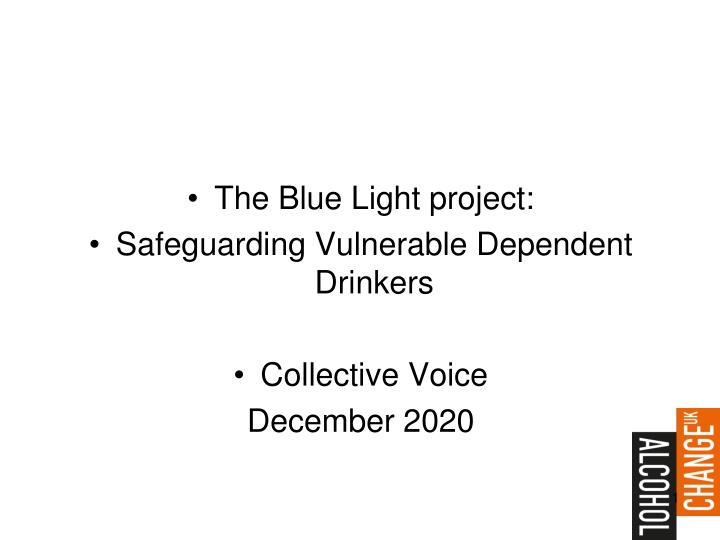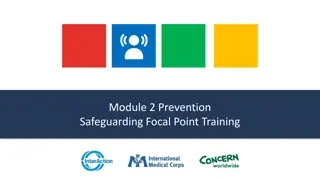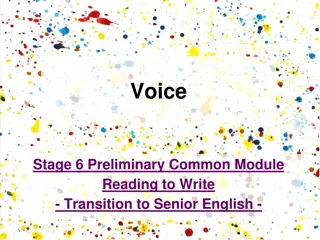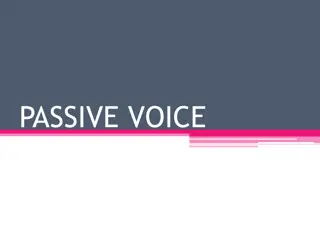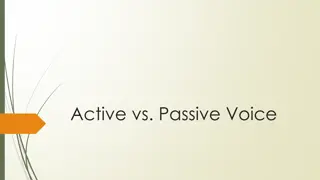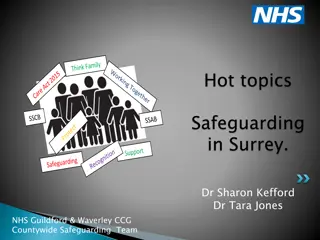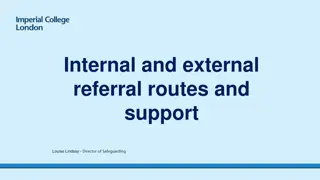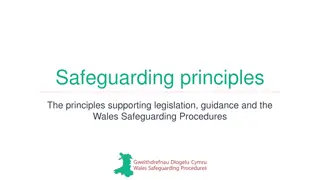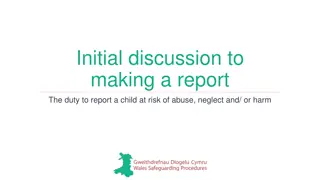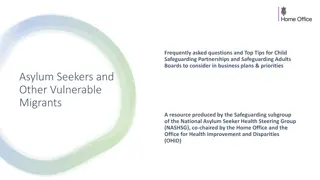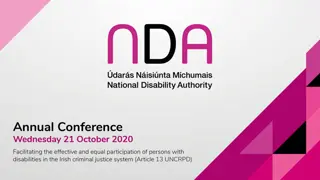Safeguarding Vulnerable Drinkers: Collective Voice
The Blue Light project focuses on safeguarding vulnerable dependent drinkers, highlighting the challenges faced by individuals with alcohol-related concerns. It brings attention to the significant incidents and correlations related to alcohol abuse, emphasizing the importance of family dynamics in safeguarding measures. The project sheds light on the impact of alcohol dependency on individuals and society, urging for comprehensive support systems and interventions to address the complexities of alcohol-related vulnerabilities.
Download Presentation

Please find below an Image/Link to download the presentation.
The content on the website is provided AS IS for your information and personal use only. It may not be sold, licensed, or shared on other websites without obtaining consent from the author.If you encounter any issues during the download, it is possible that the publisher has removed the file from their server.
You are allowed to download the files provided on this website for personal or commercial use, subject to the condition that they are used lawfully. All files are the property of their respective owners.
The content on the website is provided AS IS for your information and personal use only. It may not be sold, licensed, or shared on other websites without obtaining consent from the author.
E N D
Presentation Transcript
The Blue Light project: Safeguarding Vulnerable Dependent Drinkers Collective Voice December 2020 1
Domestic Homicide Reviews Inquiries into Homicides by Mentally Ill People Safeguarding Adult Reviews 3
7 Alcoholic Angie In 3 years, over 1000 recorded direct contacts with mental health and alcohol services, ambulance, hospital. 472 reported incidents to the police.
Analysis of SARs published in 2017 41 reviews were found in total, 15 of which mention alcohol. In 11 alcohol was a problem for the adult being safeguarded. In every case, the serious incident was the death of the adult. 9
Alcohol-Related SARs Professor Michael Preston-Shoot s SAR analysis Additional 5 cases where someone in the person s environment was alcohol- dependent Highlights the importance of thinking family (domestic abuse, impact on children, understanding family and relational dynamics) One case of a paid carer being alcohol-dependent 57 cases (25%) where the principal focus was on a person with alcohol-related concerns Correlations with self-neglect and/or homelessness Examples of fire deaths involving alcohol abuse Impact of loss and trauma
A motivation focused approach perpetuates the exclusion of the already most socially excluded clients. 11
At the end of the Blue Light pathway there are clients who are not changing and whose vulnerability means that they require some more structured framework to manage their behaviour. 12
Legal literacy Professionals need a better understanding of the legal structures that can support and manage these very challenging clients. 13
Our national project to produce guidance and training on legal literacy with substance misusers. 14
Section 2 Legal powers 15
Powers Containment Powers For Substance Misusers The Care Act 2014 (England) Mental Capacity Act 2005 (including DOLS and LPS) Mental Health Act 1983/2007
Summary The Care Act 2014 applies to people with alcohol problems. Dependent drinkers with care and support needs have a right to assessment under the Act and, if they meet certain criteria, the right to a care package. Dependent drinkers who are vulnerable, abused or self-neglecting require safeguarding by local authorities. Self-neglect (and/or living with abuse and exploitation) should never be regarded as a lifestyle choice . 18
Summary The Mental Capacity Act 2005 applies to people with mental impairments due to the symptoms of alcohol or drug use The compulsion associated with an addictive behaviour can be argued to over-ride someone s understanding of information about the impact of their drinking. This can imply a lack of capacity. Assessing capacity of dependent drinkers is very complex and should never be subject to quick and simplistic judgements. 20
Summary Decisions may require multi-agency discussion and professional challenge. Executive capacity should be included explicitly in assessments, linked to the person s ability to use and weigh information. It is important to consider what is in the client s best interest. 21
The Mental Health Act 1983 and 2007 amendments 22
Summary The Mental Health Act (2007) defines a mental disorder as any disorder or disability of the mind . The Act s definition of a mental disorder includes Mental and behaviour disorders caused by psychoactive substances . It is possible to detain someone under the Act if they have disordered mental functioning due to their chronic drinking. 23
Summary Such actions are likely to be rare and current practice does not make much use of this option. It would need to be a last resort and represent the least restrictive option now available to meet the person s treatment needs. Models of interventions in detained settings are available in other countries. 24
Summary The challenge is that there needs to be a facility in which this treatment can occur. This may need to be purchased from the private sector, if places cannot be made available in the local context. 25
And finally There will be more detailed training locally on this from January
` mike.ward@alcoholchange.org.uk www.alcoholchange.org.uk
